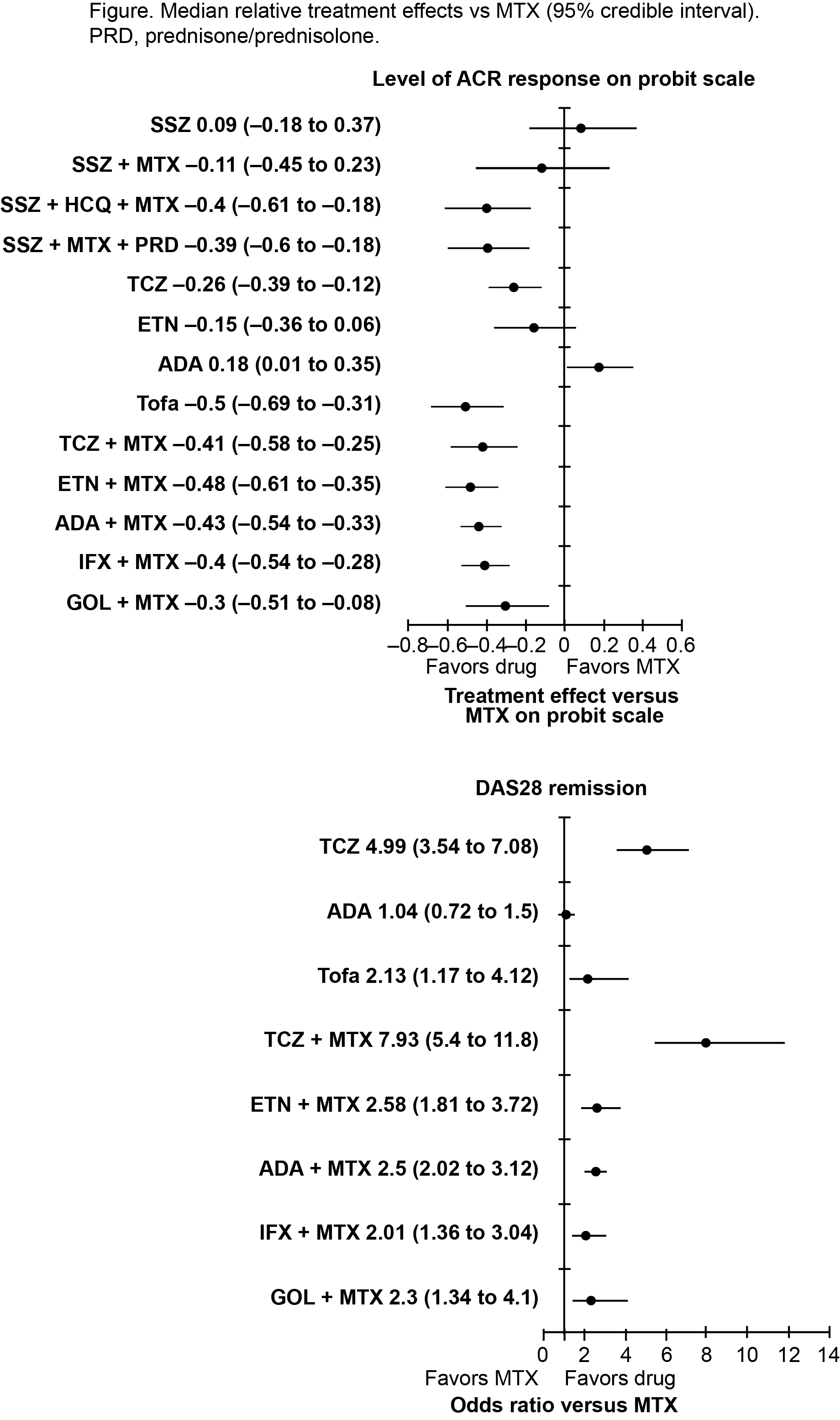Session Information
Session Type: Abstract Submissions (ACR)
Background/Purpose: To date, no head-to-head trials have been conducted comparing the efficacy of biologic treatments for early active rheumatoid arthritis (ERA). Here, we evaluated the effectiveness of tocilizumab (TCZ) compared with other traditional and biologic disease-modifying antirheumatic drugs (tDMARDs and bDMARDs), alone and in combination, in adult patients with moderate to severe ERA who have not been treated with methotrexate (MTX) or bDMARDs.
Methods: A literature review was undertaken to identify randomized controlled trials (RCTs) of tDMARDs and bDMARDs in patients with ERA (duration, <3 years) that reported efficacy outcomes, including the proportions of patients achieving American College of Rheumatology (ACR) scores of 20, 50, 70, and 90 and disease activity score (DAS28)–defined remission (DAS28 <2.6). Study data were pooled using Bayesian network meta-analysis techniques. For ACR response, data were analyzed using a fixed-effects (FE) ordered probit model, which makes efficient use of ordered categorical data and guarantees coherent prediction of multinomial response probabilities. For DAS remission, data were analyzed with an FE binomial logit model. The analysis included only results for treatments in licensed doses. Sensitivity analyses tested the effects of grouping treatments by class and broadening and narrowing inclusion criteria.
Results: We included 16 RCTs of tDMARDs (MTX, sulfasalazine [SSZ], hydroxychloroquine [HCQ]), bDMARDs (abatacept [ABT], adalimumab [ADA], etanercept [ETN], infliximab [IFX], golimumab [GOL], and TCZ), and tofacitinib (Tofa). Results indicate that all bDMARDs + MTX, triple tDMARD therapies, and TCZ and Tofa in monotherapy significantly increased response across all ACR categories versus MTX. (Figure). Probabilities of ACR response to bDMARDs + MTX were broadly similar, with no significant differences between agents. Probabilities of ACR response to bDMARDs in monotherapy were more varied, with a trend toward higher values for Tofa and TCZ than for ETN or ADA. Only a subset of studies reported DAS remission. Results show that treatment with Tofa or any bDMARD (± MTX) except ADA alone improved the likelihood of DAS remission versus MTX. TCZ (± MTX) generated the highest probability of remission among bDMARD agents and was significantly more effective than all other bDMARDs (± MTX) and Tofa. Results across both outcomes were robust to alternative grouping of interventions and to change in the inclusion criteria.
Conclusion: Based on ACR response, the expected efficacy of bDMARDs + MTX, Tofa and TCZ monotherapy, and triple tDMARD therapy appears comparable in early RA. TCZ and Tofa in monotherapy are more effective than ADA alone and are likely to be more effective than ETN alone. TCZ ± MTX is expected to have the highest probability of generating DAS.
Disclosure:
L. Sawyer,
F. Hoffmann-La Roche,
5;
S. Chang,
F. Hoffmann-La Roche,
5;
A. Diamantopoulos,
F. Hoffmann-La Roche,
5;
F. Dejonckheere,
F. Hoffmann-La Roche,
5.
« Back to 2014 ACR/ARHP Annual Meeting
ACR Meeting Abstracts - https://acrabstracts.org/abstract/efficacy-of-biologic-treatments-in-early-active-rheumatoid-arthritis-an-indirect-comparison/

